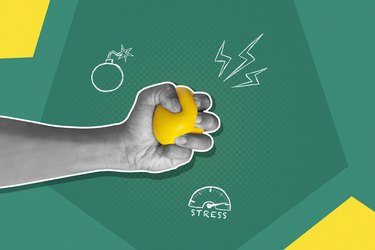
You know the feeling: sweaty palms, racing heart, somersaulting stomach — you're stressed out, and it's taking a toll on your body as well as your mind. Psychological stress may not always have a physical cause, but it certainly can show up in physical ways.
"Stress comes from a perceived threat," Delishia Pittman, PhD, assistant professor of counseling at George Washington University and practicing psychologist in Washington, D.C., tells LIVESTRONG.com. "When your brain detects something that could do you harm, it mobilizes the body to defend itself."
Video of the Day
Video of the Day
Some threats are physical — like if you see a bear while walking through the woods, for example. Others are mental or emotional: Arguing with a loved one, being treated unfairly at work or awaiting the results of an important test can also be stressful, and they still jeopardize your wellbeing, even without the threat of bodily harm.
"Unfortunately, your body can't tell the difference between the threat of a bear and the threat of bad test results, so it responds in the same way physiologically speaking," Aly Inclan, NP, psychiatric nurse practitioner at UofL Health, tells LIVESTRONG.com. "The intensity of the response may vary based on threat level, but the response itself is the same."
That response includes different organ systems and body parts. In fact, it's difficult to think of a part of the body that's not affected by stress in some way.
Here are a few of the notable ways the body reacts to tense situations and how to protect yourself from the harmful side effects of stress.
Your Senses

Stress triggers the release of hormones and chemicals in the brain that produce what's known as a "fight or flight response," Inclan says. Two of those hormones are epinephrine (also known as adrenaline) and cortisol.
When epinephrine is released into the bloodstream, it dilates airways and extra oxygen is sent to the brain. This causes a heightened sense of alertness and can sharpen senses like taste, smell and hearing as well, according to Harvard Health Publishing.
Of course, stress can also be a distraction. It's possible for people to be under so much stress that they don't notice smells, tastes or sights that they normally would, Pittman says.
And over time, it's possible for senses like vision to be damaged by high blood pressure, which has been linked to chronic stress.
Your Muscles
If you tend to clench your jaw, ball your hands into fists or otherwise tense up when you're under a lot of stress, you're not alone. These behaviors come from the action of epinephrine on our muscles, Inclan says.
"Your muscles are prepared for quick action," she says. "This is the body's urge to do something to escape the perceived threat."
But according to the American Psychological Association, this type of muscle tension can lead to problems like headaches, neck and back pain and even long-term injuries.
Bruxism, or teeth grinding, is also a common condition linked to stress.
"Often people grind their teeth in their sleep, which can wear down teeth and cause headaches, jaw pain and eye strain," Pittman says. "But I've also known people who grind their teeth or clench their jaw while they're awake as well."
Your Brain

When it comes to mindset and productivity, stress can be a motivator — or a roadblock.
"Some people thrive under stress and can spring into action and make things happen, and others are paralyzed by it," Pittman says.
Stress has also been linked to clinical depression and anxiety, as well as cognitive issues. In a 2,000-person study published in the November 2018 edition of Neurology, young and middle-aged adults with higher levels of cortisol circulating in their bodies were more likely to have memory problems and lower brain volumes.
And perhaps most obviously, stress can affect your mood.
"All of that epinephrine makes you ready for action, but if there is no real threat and therefore no release of that response, then you might just feel constantly on edge or irritable," Inclan says. "Oftentimes people find that they get angry with very little provocation."
"Protecting you from the flu isn't a priority when you're running from a bear."
Your Skin
Skin is the largest organ of the body, and research shows it can be affected in numerous ways by psychological stress.
According to a June 2014 review published in Inflammation & Allergy Drug Targets, stress can trigger or exacerbate inflammatory conditions such as psoriasis, atopic dermatitis (eczema) and acne. Stress has also been associated with delayed wound healing and, in some studies, premature skin aging.
Then there are the more immediate effects of stress on the skin: On some occasions, stress can induce flushing and perspiration. And for some people, periods of stress can trigger behaviors like nail biting, picking or scratching.
Unfortunately, these habits may not just be harmless nuisances: They can lead to irritation or even infection, according to the University of Chicago.
Your Heart

A heightened fight-or-flight response raises blood pressure and causes the heart to work overtime, says Inclan. For fleeting, short-term stressors — like being nervous for a few hours before a presentation, or while watching a scary movie — this usually is not a big deal, as long as things return to normal soon after.
But there have been reports of sudden stressors causing cardiovascular events: Broken heart syndrome, for example, is a condition that resembles a heart attack and occurs when an emotional or painful event (like the death of a loved one) causes chest pains and shortness of breath, according to the Cleveland Clinic.
On a long-term basis, stress can be much more harmful to the heart and blood vessels. Elevated levels of stress hormones can lead to chronic high blood pressure, which, if left untreated, can cause artery stiffening, kidney failure and sexual dysfunction, among other complications.
Chronic stress is also linked to heart disease, according to the American Heart Association (AHA), as well as increased risk of heart attack, per a December 2020 study in Scientific Reports.
Your Immune System
Stress has been connected to other types of illnesses, too. One reason? Chronic cortisol elevation negatively affects immune system functioning, leaving the body more vulnerable to disease.
"Protecting you from the flu isn't a priority when you're running from a bear," Inclan explains.
Your Gut
Many people notice a link between how they're feeling mentally and how their stomach feels physically. In fact, this is so common that the gut is sometimes referred to as "the second brain," according to Johns Hopkins Medicine.
"We know that when you're stressed, the body secretes lots of hormones, and that some of those hormones can leak into the gut and disrupt the natural flora of the digestive tract," says Pittman. "This can lead to constipation, nausea, diarrhea or even irritable bowel syndrome."
In a 30-day study of 150 runners published in the August 2018 edition of the Journal of Sports Sciences, researchers found a direct link between perceived life stress and more reports of diarrhea and GI distress.
Your Weight

In addition to gastrointestinal issues, stress can also dampen appetite, Pittman says. For these reasons, it can be linked to weight loss.
On the other hand, for some people, feelings of anxiety and uncertainty can trigger stress eating and cravings for fatty comfort meals and sugary junk food. It's probably not surprising, then, that stress can also contribute to unwanted weigh gain, according to the Mayo Clinic.
6 Stress-Busting Tips
Stress is inevitable, especially during times of crisis and uncertainty. But that doesn't mean you can't work to eliminate some points of tension in your life, and learn to better cope with the stressors you can't avoid.
Here are some things that might help:
1. Get regular exercise. Breaking a sweat can take your mind off what's bothering you, and it can also counteract some of the harmful effects of stress. Practicing yoga may be especially beneficial, according to Harvard Health Publishing.
2. Spend time in nature. Sunshine and fresh air can be a powerful stress-reliever, according to the AHA.
3. Don't turn to cigarettes or heavy alcohol use. Many people turn to controlled substances for stress relief, but in the long run they will only worsen health concerns. Instead, look for healthy alternatives when you're craving a smoke or a drink.
4. Practice deep breathing. When you're stressed, you may not notice if your breathing becomes quick or erratic. Focusing on your breath can help slow your heart beat and calm your body's flight-or-fight response.
5. Say "no" when necessary. "It's important to really think about the bandwidth you have and not take on more than you can handle emotionally," Pittman says.
6. Talk to someone. If stress is interfering with your ability to be happy and productive, talk to your doctor or a mental-health professional about treatments that might help.
- Harvard Health Publishing: "Understanding the stress response"
- APA: "Stress Effects On the Body"
- Neurology: "Circulating cortisol and cognitive and structural brain measures"
- Inflammation & Allergy Drug Target: "Brain-Skin Connection: Stress, Inflammation and Skin Aging"
- University of Chicago: "Excoriation disorder: When scratching becomes more than a nervous habit"
- Johns Hopkins Medicine: "The Brain-Gut Connection"
- Journal of Sports Sciences: "Perceived life stress and anxiety correlate with chronic gastrointestinal symptoms in runners."
- Harvard Health Publishing: "Yoga could slow the harmful effects of stress and inflammation"
- American Heart Association: "Spend Time in Nature to Reduce Stress and Anxiety"
- American Heart Association: "Stress and Heart Health"
- Scientific Reports: "Elevated levels of cortisol in hair precede acute myocardial infarction"
Is this an emergency? If you are experiencing serious medical symptoms, please see the National Library of Medicine’s list of signs you need emergency medical attention or call 911.






